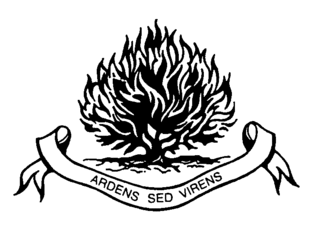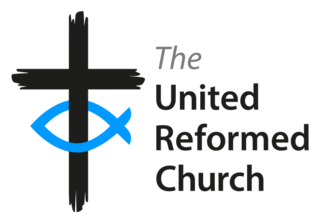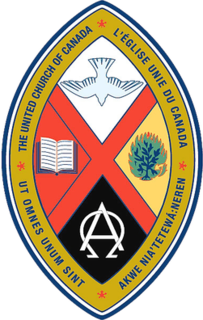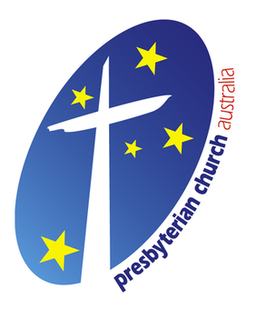
Presbyterianism is a part of the Reformed tradition within Protestantism, which traces its origins to Great Britain, specifically Scotland.
Presbyterianpolity is a method of church governance typified by the rule of assemblies of presbyters, or elders. Each local church is governed by a body of elected elders usually called the session or consistory, though other terms, such as church board, may apply. Groups of local churches are governed by a higher assembly of elders known as the presbytery or classis; presbyteries can be grouped into a synod, and presbyteries and synods nationwide often join together in a general assembly. Responsibility for conduct of church services is reserved to an ordained minister or pastor known as a teaching elder, or a minister of the word and sacrament.

The United Reformed Church (URC) is a Protestant Christian church in the United Kingdom. It has approximately 46,500 members in 1,383 congregations with 608 active ministers, including 13 church related community workers.

Congregational churches are Protestant churches in the Reformed tradition practising congregationalist church governance, in which each congregation independently and autonomously runs its own affairs.

The United Church of Canada is a mainline Protestant denomination that is the largest Protestant Christian denomination in Canada and the second largest Canadian Christian denomination after the Catholic Church in Canada.

The Uniting Church in Australia (UCA) was founded on 22 June 1977, when most congregations of the Methodist Church of Australasia, about two-thirds of the Presbyterian Church of Australia and almost all the churches of the Congregational Union of Australia united under the Basis of Union. According to the church, it had 243,000 members in 2018. In the 2016 census, about 870,200 Australians identified with the church; in the 2011 census, the figure was 1,065,796. The UCA is Australia's third-largest Christian denomination, behind the Catholic and the Anglican Churches. There are around 2,000 UCA congregations, and 2001 National Church Life Survey (NCLS) research indicated that average weekly attendance was about 10 per cent of census figures.

A united church, also called a uniting church, is a church formed from the merger or other form of union of two or more different Protestant Christian denominations.

The Church of South India (CSI) is a united Protestant Church, being the second-largest Christian church in India based on the number of members; it is the result of union of a number of Protestant churches in South India.
The Congregational Christian Churches were a Protestant Christian denomination that operated in the U.S. from 1931 through 1957. On the latter date, most of its churches joined the Evangelical and Reformed Church in a merger to become the United Church of Christ. Others created the National Association of Congregational Christian Churches or joined the Conservative Congregational Christian Conference that formed earlier in 1945. During the forementioned period, its churches were organized nationally into a General Council, with parallel state conferences, sectional associations, and missionary instrumentalities. Congregations, however, retained their local autonomy and these groups were legally separate from the congregations.

The Wesleyan Methodist Church of Australia is a Christian denomination with its origins in Wesleyan Methodism. It is the organisational name for contemporary The Wesleyan Church in Australia.

The Presbyterian Church of Australia (PCA) is the largest Presbyterian denomination in Australia.
Harold D'Arcy Wood is a semi-retired minister of the Uniting Church in Australia (UCA) and was President of the UCA Assembly from 1991 to 1994. He has been active in ecumenism in Australia and globally.

The Congregational Union of Australia was a Congregational denomination in Australia that stemmed from the Congregational Church in England as settlers migrated from there to Australia.
The Fellowship of Congregational Churches is a conservative Congregational denomination in Australia. It was formed by the forty congregations of the Congregational Union of Australia who chose not to join the Uniting Church in Australia in 1977.
The Methodist Church of Australasia was a Methodist denomination based in Australia. On 1 January 1902, five Methodist denominations in Australia – the Wesleyan Methodist Church, the Primitive Methodists, the Bible Christian Church, the United Methodist Free and the Methodist New Connexion Churches came together to found a new church. In polity it largely followed the Wesleyan Methodist Church. This Church established a General Conference, meeting triennially, for Australasia in 1875, with Annual Conferences in the States.
Ecclesiastical polity is the operational and governance structure of a church or of a Christian denomination. It also denotes the ministerial structure of a church and the authority relationships between churches. Polity relates closely to ecclesiology, the study of doctrine and theology relating to church organization.

St Margaret's Uniting Church is a Uniting church in Hackett, Australian Capital Territory, Australia.

Ordination is the process by which individuals are consecrated, that is, set apart as clergy to perform various religious rites and ceremonies such as celebrating the sacraments. The process and ceremonies of ordination varies by denomination. One who is in preparation for, or who is undergoing the process of ordination is sometimes called an ordinand. The liturgy used at an ordination is sometimes referred to as an ordinal.
Winston D'Arcy O'Reilly was a Methodist and then Uniting Church in Australia (UCA) minister and the second President of the UCA Assembly.

Scots Church is a stone Uniting Church building on the southwest corner of North Terrace and Pulteney Street in Adelaide, the capital city of South Australia. It was one of the early churches built in the new city in 1850. It was built as the "Chalmers Free Church of Scotland".












